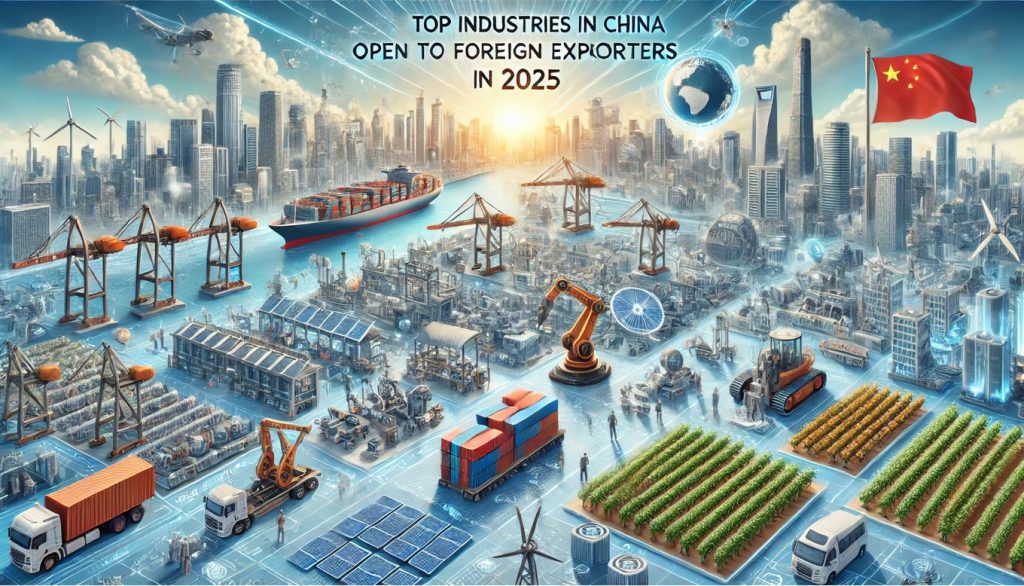As one of the world’s largest and most dynamic economies, China presents enormous opportunities for foreign exporters. Despite ongoing challenges and competition from domestic companies, China’s appetite for foreign goods and services remains robust, especially in industries that align with the country’s modernization goals. With its substantial consumer base, vast infrastructure, and shifting regulatory environment, China remains a vital market for international businesses in 2025.
This article explores the most promising sectors for foreign exporters in China in 2025, covering technology, automotive, healthcare, renewable energy, e-commerce, agriculture, construction, and leisure industries. These industries not only highlight China’s current economic priorities but also indicate future trends that will shape the global trade landscape.
Technology and Electronics
Consumer Electronics: The Growing Demand
In 2025, the consumer electronics industry remains one of the most lucrative sectors for foreign exporters looking to enter the Chinese market. As China’s middle class expands and urbanization accelerates, demand for the latest gadgets and high-tech appliances continues to rise. From smartphones to home entertainment systems, Chinese consumers are increasingly willing to pay a premium for advanced, international technology brands that offer superior quality and innovative features.
Apple, Samsung, and other established foreign brands continue to dominate the high-end electronics market, benefiting from China’s rapid embrace of mobile technology and digital lifestyles. The demand for wearable devices, such as smartwatches and fitness trackers, remains particularly strong, alongside the growing popularity of home automation products, including smart thermostats, lights, and security systems.
Semiconductor and Microelectronics
China’s semiconductor industry is one of the most critical areas of focus for both the government and foreign exporters. The country has long been dependent on imports for advanced semiconductor chips and equipment, which are essential for manufacturing a wide range of products, from smartphones to AI-powered devices. While China has made strides in developing domestic capabilities, it still lacks the expertise and production scale required to produce the most advanced microchips.
For foreign companies involved in semiconductor manufacturing and technology, this sector presents tremendous opportunities. Companies that can supply photomasks, lithography equipment, microchip testing tools, and other critical components will find a receptive market. Furthermore, with the rise of 5G, artificial intelligence (AI), and the Internet of Things (IoT), the demand for specialized chips and electronic components is expected to grow exponentially. Thus, foreign semiconductor producers are well-positioned to meet China’s technological ambitions, which include becoming more self-sufficient in high-end microelectronics.
Automotive and Electric Vehicles (EVs)
The Electric Vehicle (EV) Boom
China’s automotive sector, particularly the electric vehicle (EV) market, is one of the world’s largest and most rapidly growing. As part of its green development goals, the Chinese government has committed to reducing carbon emissions and increasing the adoption of renewable energy technologies. One of the central pillars of this plan is the widespread adoption of electric vehicles, which has created significant demand for EV components, charging infrastructure, and advanced battery technology.
Foreign exporters specializing in electric vehicle batteries, EV chargers, and sustainable energy solutions are in a prime position to take advantage of this opportunity. China’s demand for high-performance, long-lasting batteries continues to grow, particularly for electric cars, buses, and two-wheelers. The Chinese government has introduced policies to incentivize EV purchases and charging infrastructure, creating an increasingly favorable environment for foreign companies looking to enter this market.
Moreover, established international brands like Tesla, BMW, and Volkswagen have already made substantial inroads into China’s EV sector, contributing to the market’s rapid expansion. Foreign automakers that manufacture or partner with local companies to produce electric vehicles will find that China’s increasing adoption of EVs provides a lucrative avenue for growth.
Traditional Automotive Industry
In addition to the booming electric vehicle sector, China remains a massive market for traditional gasoline-powered vehicles. Despite the government’s push for EVs, the demand for luxury, high-performance, and premium cars is still strong. International brands, particularly those from Europe and the U.S., have long enjoyed success in China’s high-end automotive market, catering to a growing number of affluent consumers seeking premium cars.
Foreign companies that offer luxury vehicle brands such as Mercedes-Benz, Audi, and Land Rover continue to perform well, especially among the urban elite in cities like Shanghai, Beijing, and Shenzhen. Even though the growth rate of traditional vehicle sales may be slowing in comparison to EVs, foreign companies still find opportunities in niche markets such as high-performance sports cars, electric vehicles (EVs), and imported vehicles with advanced safety and performance features.
Healthcare and Pharmaceuticals
The Expanding Healthcare Sector
China’s rapidly aging population and the increasing prevalence of lifestyle diseases such as diabetes, heart disease, and cancer have led to a surge in demand for healthcare products, services, and technologies. The Chinese healthcare market is projected to continue expanding, fueled by increasing government investment, higher disposable incomes, and a shift toward more advanced, specialized treatments. Foreign exporters in the healthcare and pharmaceutical sectors are well-positioned to benefit from this growing demand.
Medical devices, diagnostic equipment, and advanced surgical tools are highly sought after in China. The country’s healthcare infrastructure is modernizing at a rapid pace, with hospitals and clinics looking to adopt the latest technologies to improve patient care. Foreign companies specializing in innovative medical equipment, such as imaging systems, robotic surgery instruments, and minimally invasive tools, will find significant demand in this market.
Pharmaceutical Products and Biotech
China’s pharmaceutical market is one of the largest in the world, and it is set to continue growing as the country grapples with an aging population and increasing healthcare needs. Foreign pharmaceutical companies, particularly those specializing in oncology, neurology, and rare diseases, are in high demand as China seeks to address its healthcare challenges. Additionally, biotech products, including gene therapies, vaccines, and biologics, represent a growing market as China continues to modernize its healthcare system.
The regulatory environment in China has become more conducive to foreign pharmaceutical companies, with the government fast-tracking the approval process for new drugs and treatments. This shift presents ample opportunities for foreign companies to enter the Chinese market with innovative drugs, especially in fields like immunotherapy, biologics, and personalized medicine.
Renewable Energy
Solar, Wind, and Clean Energy Technologies
China is the world’s largest producer and consumer of renewable energy, and the country’s commitment to achieving carbon neutrality by 2060 creates significant opportunities for foreign exporters in the green energy sector. The rapid expansion of solar and wind energy installations, along with large-scale infrastructure projects to support clean energy generation, presents ample opportunities for companies that can provide advanced renewable energy technologies, equipment, and solutions.
Foreign companies specializing in solar panels, wind turbines, and energy storage systems are well-positioned to benefit from China’s ambitious energy transition. The country is investing heavily in renewable energy projects, and foreign suppliers of photovoltaic cells, inverters, and grid integration technologies will find a receptive market. Additionally, China’s government is providing incentives for businesses that invest in green energy projects, such as tax credits and subsidies, which further enhance opportunities for foreign exporters.
Green Hydrogen and Carbon Capture
As part of its long-term sustainability efforts, China is increasingly investing in green hydrogen production and carbon capture technologies. Green hydrogen, produced from renewable energy sources, is expected to play a key role in China’s energy transition. Foreign companies with expertise in hydrogen production, storage, and distribution technologies have the opportunity to contribute to the development of a green hydrogen economy in China.
Similarly, carbon capture and storage (CCS) technologies are becoming more important as China works to reduce its carbon emissions. Foreign firms that specialize in advanced CCS technologies will find a growing demand for their solutions, as China seeks to meet its climate targets while maintaining economic growth.
E-Commerce and Digital Services
E-Commerce Growth
China is the world’s largest and most advanced e-commerce market, and its digital retail sector continues to expand rapidly. Online shopping platforms such as Alibaba, JD.com, and Pinduoduo dominate the market, offering foreign companies a relatively straightforward entry point into China’s vast consumer market. E-commerce allows foreign exporters to bypass traditional retail channels and tap directly into the Chinese consumer base, including smaller cities and rural areas.
In 2025, consumer demand for a wide range of products – from fashion and electronics to health products and luxury goods – remains strong. Foreign companies can utilize e-commerce platforms to sell directly to Chinese consumers, particularly those in the growing middle class who are seeking high-quality imported goods. Additionally, China’s thriving digital payment ecosystem, including platforms like Alipay and WeChat Pay, makes it easier for foreign businesses to transact with Chinese customers.
Digital Services and Cloud Computing
Foreign companies offering cloud computing, software-as-a-service (SaaS), and artificial intelligence (AI)-driven solutions are increasingly in demand in China. As Chinese businesses transition to cloud-based services and digital infrastructure, there is significant demand for foreign expertise in these areas. The rise of digital services, including e-commerce, fintech, and enterprise software, opens new avenues for foreign companies to provide specialized software solutions that help Chinese companies streamline operations and enhance customer engagement.
Moreover, the increasing adoption of AI and big data technologies in China offers opportunities for foreign companies that specialize in machine learning, predictive analytics, and data-driven solutions. China’s digital economy is growing rapidly, and foreign companies with advanced technologies will continue to find opportunities in this ever-expanding market.
Agriculture and Food Products
High-Quality Imported Foods
China has long been a major importer of agricultural products, and this trend is expected to continue in 2025. With changing dietary habits, urbanization, and rising incomes, the demand for imported food products, including high-quality dairy, wine, meat, and processed foods, is growing. China’s large and diverse population presents a significant market for foreign agricultural exporters.
Foreign companies exporting premium food products such as organic produce, gourmet snacks, wine, and specialty beverages can take advantage of the growing demand for international food brands. Chinese consumers are increasingly looking for healthy and high-quality food options, especially from countries with a reputation for high food safety standards.
Agricultural Technology
In addition to food products, China is embracing agricultural technology to improve crop yields, reduce environmental impacts, and increase efficiency in farming. This shift is creating opportunities for foreign exporters of agricultural machinery, precision farming tools, irrigation systems, and crop protection technologies. With the adoption of smart farming practices and the integration of IoT technologies into agriculture, foreign companies that offer innovative solutions for precision agriculture, drone-based monitoring, and data analytics can find significant opportunities in China’s agricultural market.
Infrastructure and Construction
Urbanization and Infrastructure Projects
China’s rapid urbanization continues to fuel demand for construction materials, infrastructure development, and real estate projects. As cities expand and infrastructure improves, the need for materials such as steel, cement, and specialized construction products remains strong. Foreign companies that can supply high-quality construction materials, engineering tools, and machinery will find ample opportunities in this thriving market.
Additionally, China’s continued investment in mega-projects such as high-speed rail, highways, and green building construction further enhances the demand for foreign construction expertise and materials. Companies that specialize in energy-efficient building materials, smart construction solutions, and sustainable design are well-positioned to capitalize on China’s infrastructure development.
Smart Cities and Green Building Solutions
As part of its sustainability efforts, China is investing in the development of smart cities and green building technologies. Foreign companies specializing in energy-efficient construction, smart building systems, and sustainable urban planning will find opportunities as China embraces environmentally-friendly and technology-driven urban development. From smart grids to integrated mobility solutions, the demand for innovative solutions in smart cities is growing.
Tourism and Leisure
Domestic and International Tourism
With its growing middle class and vast geographical diversity, China remains an attractive destination for both domestic and international tourism. Foreign companies involved in luxury travel, hotel services, and international tourism packages can benefit from China’s growing outbound travel market. Moreover, China’s post-pandemic recovery has sparked a renewed interest in domestic tourism, creating opportunities for international brands to tap into both the inbound and outbound tourism markets.
Sports and Leisure Goods
China’s growing interest in fitness, outdoor activities, and sports is creating demand for imported sports equipment, athletic wear, and recreational products. Foreign companies that specialize in fitness equipment, outdoor gear, and wellness products are well-positioned to meet the needs of China’s expanding leisure and sports market.







